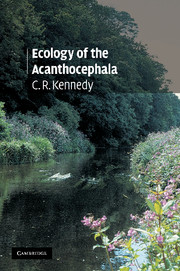Book contents
6 - Population dynamics
Published online by Cambridge University Press: 12 August 2009
Summary
GENERAL CONSIDERATIONS
The population dynamics of a species can be approached from several different perspectives. One of these is an appreciation that the effects of a parasite upon its host can be considered at several levels: from the effects on an individual host to the effects on a population of hosts and so to the effects on the community in which these hosts exist. Dynamics can also be studied over different timescales, ranging from short-term studies of seasonal changes in population parameters to long-term studies of stability and persistence of parasite populations.
The stability of parasite populations and in particular their ability to regulate their host populations have attracted considerable interest because this can have major consequences for community dynamics. Parasites could thereby affect α and γ diversity and food web organisation. As a consequence, there is a substantial body of theory concerning the operation of regulatory factors. Stability is here considered to be the ability of a parasite population to return to an equilibrium level following perturbation. Stability can only be achieved by the operation of negative feedback controls, i.e. density-dependent factors. The ways in which these factors can operate have been demonstrated in a series of mathematical model systems by Crofton (1971,a, b), Anderson & May (1978, 1979, 1982), May & Anderson (1978) and Dobson & Keymer (1985).
- Type
- Chapter
- Information
- Ecology of the Acanthocephala , pp. 101 - 124Publisher: Cambridge University PressPrint publication year: 2006

